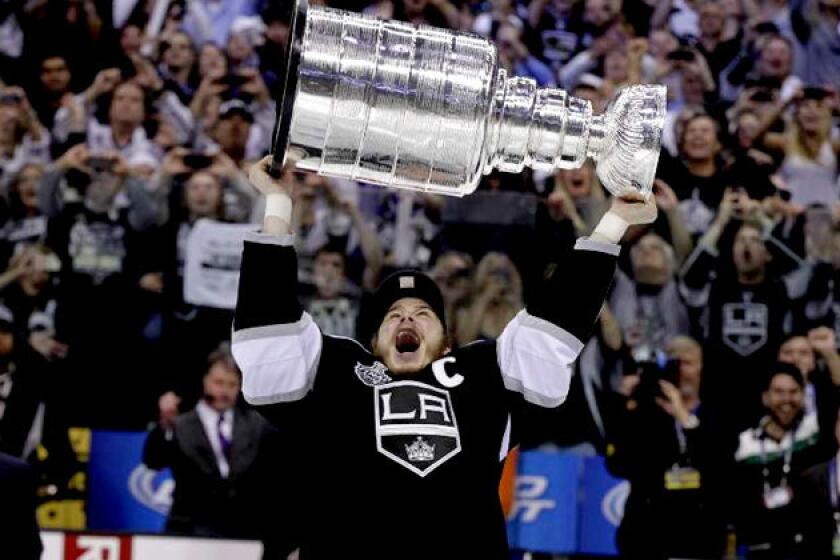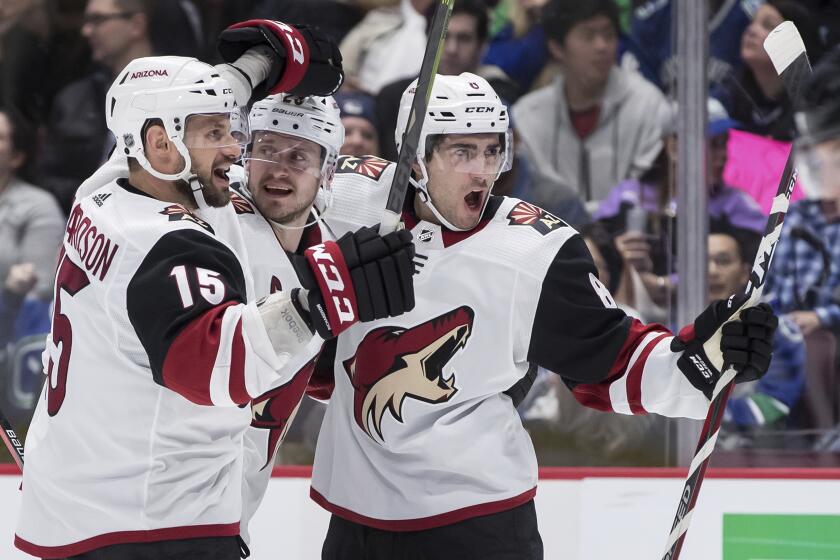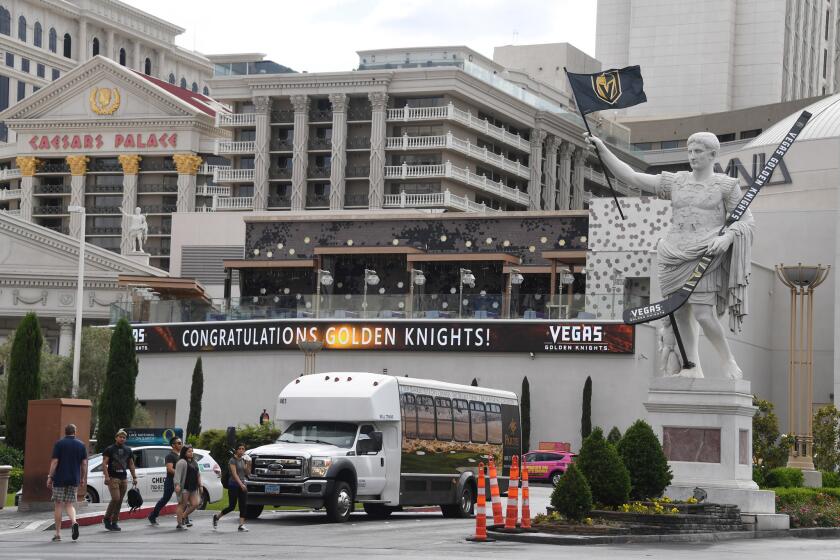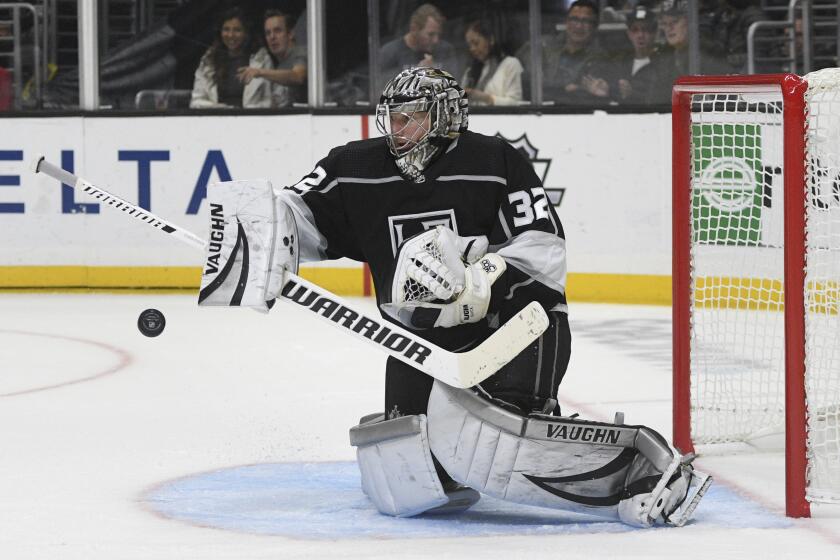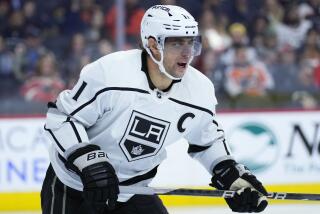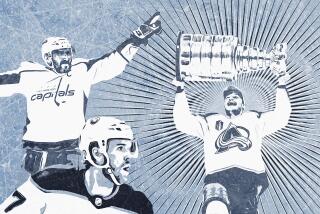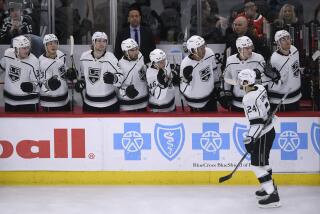There’s no shortage of work for Kings, Ducks executives during coronavirus shutdown
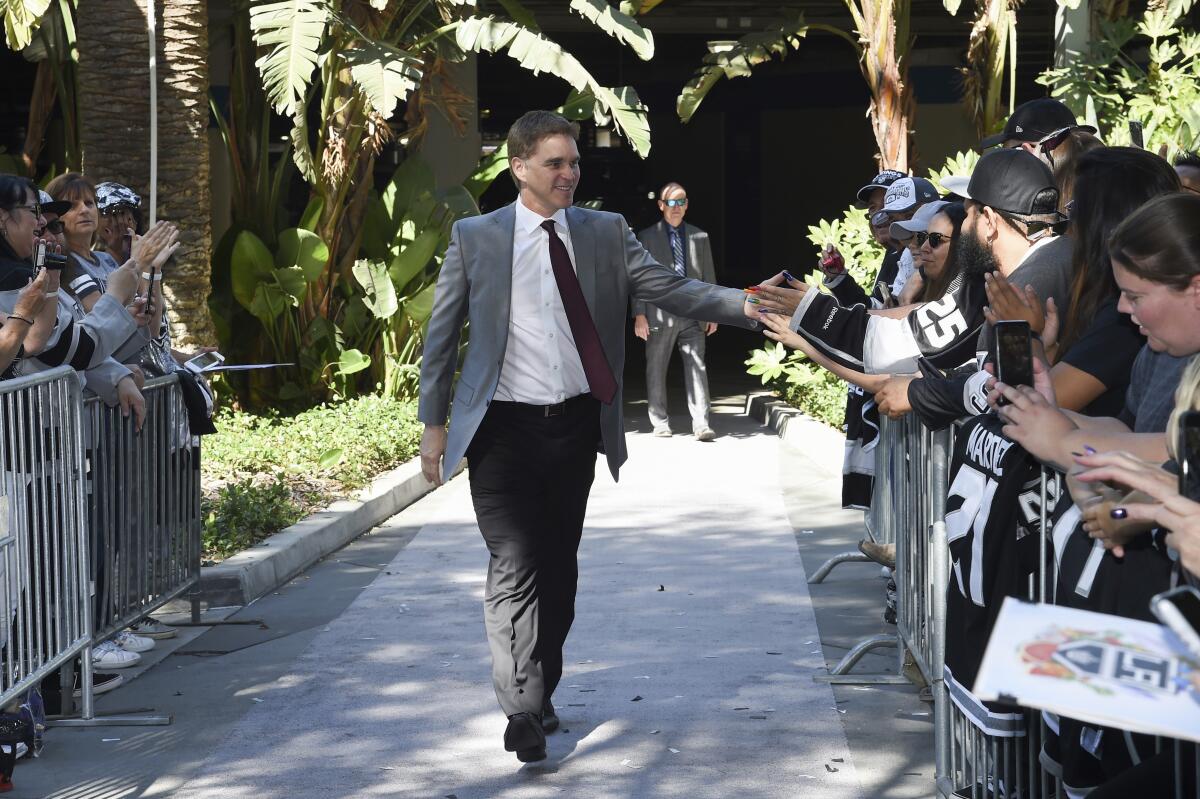
- Share via
Six weeks into the coronavirus-caused shutdown, Luc Robitaille’s indoor voice is still a work in progress.
“My wife thinks I speak too loud when I’m on those Zoom meetings or team meetings,” the Kings’ president said with a laugh. “So I try to keep it down.”
Staying completely quiet, however, hasn’t been an option. NHL games might be stopped, but Robitaille’s work remains as all-consuming as ever.
Most days, the former player, Hall of Famer and all-time fan favorite is in front of his computer by 9:30 a.m. Sometimes, he is processing plummeting revenue numbers or evaluating the on-ice statistics from his team’s incomplete season. Once a week, he joins a call with fellow NHL team presidents working on plans to get this season restarted.
But most often, he is wrapped up in conversations with fellow Kings staff members, plotting everything from marketing strategies to charity initiatives, trying to keep the wheels of a franchise turning amid the most uncertain of times.
Because the NHL relies more on gate revenue than the other major sports leagues, it will try everything possible to finish the season, columnist Helene Elliott says.
“We’re all surprised how much work it’s been,” Robitaille said. “Every one of us internally when it started thought, ‘Oh man, this is going to be weird. What’s going to happen?’ But it seems like everybody within the organization seems to be busy until like 4 o’clock every day.”
Across the NHL, executives and employees at the team level are experiencing something similar. Because while the league office frantically searches to find a way to finish this season, those working for its 31 clubs have their focus fixed elsewhere.
The fate of the 2019-20 campaign might be out of their control. But the ability to plan for, and cushion against, an unclear financial future is not.
“I don’t like getting too far into the what-ifs,” Kings chief operating officer Kelly Cheeseman said. “I don’t find it a productive use of our peoples’ time when we have to worry about how we’re operating our business.”
The NHL has proven itself resilient before. In Commissioner Gary Bettman’s 27-year tenure, the league has endured three lockouts, yet grown in value and visibility. It has survived two recessions and initiated two rounds of team expansion.
And in the face of this crisis, league officials are confident of overcoming again, cautiously optimistic that this season can be completed — albeit in a likely modified fashion and in front of empty arenas — and almost certain the 2020-21 campaign will be held in full, even if its starting date is delayed.
Arizona, Carolina, Dallas, Florida and Ottawa are the NHL teams that could be hurt the most because of the league shutdown caused by the COVID-19 pandemic.
Still, “There’s no playbook here,” said Aaron Teats, the Ducks’ president of business operations. “Normal is thrown right out the window.”
Indeed, returning from the COVID-19 pandemic won’t be nearly as simple as restarting after a lockout. Getting in games would be a good start. But teams won’t know what the future holds until it’s safe for society to settle back in.
“The conversations are starting to shift from impending issues related to the infections related to COVID and whatnot, to now getting on the backside of it and reopening and what that tiered approach looks like,” said Teats, who noted the Ducks are modeling 10 contingency plans at the moment.
“All of business is going to be in some sort of tiered rollout,” he added. “We don’t know what that looks like. I think it varies from state to state. … So, for us, we sit and let the visibility from the league side run point, and then we try to understand, from our Southern California position, what is conceivable for rolling out.”
Take the NHL’s last work stoppage, which ended in January 2013, for example. Despite losing almost half of the 2012-13 schedule, the sport quickly went back to normal once a collective bargaining agreement was struck.
Locally, a jubilant and jam-packed Staples Center crowd was on hand for the Kings’ home opener that year, when the team raised its Stanley Cup banner from the season before.
This time, there’s no guarantee the Kings’ next home game will include any crowd at all.
Gov. Gavin Newsom on Tuesday announced live-audience sporting events in California won’t be permitted until therapeutics against COVID-19 are developed and the state’s stay-at-home order is lifted, a scenario that could extend into 2021. Local and state governments in other NHL markets also are moving at a careful, calculated pace.
When competitions resume post-coronavirus quarantine, fans will celebrate the simple fact they can sit next to strangers and cheer as one.
Preparing for all those unknowns has kept teams plenty busy.
“We’re looking at every situation,” Robitaille said. “You want to be ready. But just when you think you’ve got it figured out, something else happens. So within reason, we’re looking at different scenarios of what Staples Center would look like. What it would look like if there’s a possibility of starting [next] season without fans. When would it start? And then how do we restart having everyone feel comfortable?
“We think that’s really important. We want everybody to come back and watch our games and enjoy the game, enjoy the opportunity to sit and watch games. We’re looking at all these things. But it seems to change every day.”
There is a bevy of factors to weigh. Health concerns are paramount, but so too are financial considerations. Most NHL clubs still rely on arena-generated revenues such as ticket and merchandise sales as the lifeblood of their income stream, representing as much as half of the yearly earnings for many franchises.
Even if there is a postseason this summer and a full 82-game slate next year, teams will be staring down a daunting financial hole as long as fans are forced to stay away.
“That poses an issue not just in terms of how our system works with players but the tens of thousands of people that work for clubs in all sports,” Bettman said in an interview with Sportsnet in Canada last week, “and how they’re impacted by the fact that sports has no revenue coming in.”
But the NHL, which had seven teams, including the Ducks, fail to turn a profit in 2018-19, according to Forbes’ financial reporting, could be especially exposed.
“I wouldn’t be shocked if two to four teams declared bankruptcies,” said Don Erickson, a sports valuation expert and managing director at financial advisory firm Mercer Capital, imagining a fate that has stricken NHL teams before, including most recently in 2009 when the league was forced to take temporary ownership of the Arizona Coyotes.
The Kings and Ducks seem to be standing on particularly safe ground, buoyed by two of the strongest ownership groups (the Kings’ Philip Anschutz and Edward Roski Jr. and the Ducks’ Henry and Susan Samueli are both in the top half of the league in terms of net worth and ownership length), little outstanding debt (as of last season, neither owed more than 5% of their overall franchise value, according to Forbes), and deep-rooted support in the NHL’s second-biggest market (despite poor performance this season, both averaged better than 90% crowd capacity at home).
Their front offices have taken the shift to social distancing in stride as well, becoming remotely operational within hours of last month’s suspension of play.
“Our staff has been in a pretty good mood and everybody’s still got enough work that keeps them busy,” Robitaille said. “The morale has been pleasantly, surprisingly good.”
Kings goalie Jonathan Quick knows it takes some time to regain his form after a long break. He says NHL goalies will be tested if the season resumes.
That feeling has extended to conversations team marketing representatives are having with season-ticket holders and corporate sponsors, many of whom have yet to cancel their agreements as they wait to see what the future holds.
“Every single person that you’re talking to is going through the exact same thing,” Teats said. “They are being impacted the exact same way with the exact same issues, of not being able to go out, not be able to move and do what they want to without being fearful.”
“Everyone has to deal with this together,” he added. “I feel like there’s a much stronger sense of helping each other through it, whereas in strikes and lockouts, there’s frustration.”
It’s because, dim as it may be, teams and fans alike are starting to see light on the horizon. And though they don’t know when the sun will rise on hockey’s return, they are getting ready for that day.
“We take our cues from the league office and I know they’re doing everything they can to maximize getting back to play, but they’re not going to do that outside of the recommendations of health officials,” Teats said. “So we’ll do exactly what all the other teams are doing. We’ll try to plan for a wide variety of scenarios and we’ll see which one of those is closest to reality when we get to a spot where we have facts in front of us.”
More to Read
Go beyond the scoreboard
Get the latest on L.A.'s teams in the daily Sports Report newsletter.
You may occasionally receive promotional content from the Los Angeles Times.

